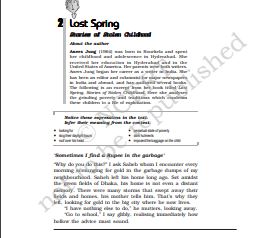‘NCERT Solutions for Class 12 English Chapter 2‘ PDF Quick download link is given at the bottom of this article. You can see the PDF demo, size of the PDF, page numbers, and direct download Free PDF of ‘Ncert Class 12 English Chapter 2 Exercise Solution’ using the download button.
NCERT Class 12 English Textbook Chapter 2 With Answer PDF Free Download

Chapter 2: The Lost Spring
‘Sometimes I find a Rupee in the garbage’
“Why do you do this?” I ask Saheb whom I encounter every morning scrounging for gold in the garbage dumps of my neighborhood.
Saheb left his home long ago. Set amidst the green fields of Dhaka, his home is not even a distant memory. There were many storms that swept away their fields and homes, his mother tells him. That’s why they left, looking for gold in the big city where he now lives.
“I have nothing else to do,” he mutters, looking away. “Go to school,” I say glibly, realizing immediately how hollow the advice must sound.
“There is no school in my neighborhood. When they build one, I will go.” “If I start school, will you come?” I ask, half-joking.
“Yes,” he says, smiling broadly. A few days later I see him running up to me. “Is your school ready?” “It takes longer to build a school,”
I say, embarrassed at having made a promise that was not meant. But promises like mine abound in every corner of his bleak world. After months of knowing him, I ask him his name.
“Saheb-e-Alam,” he announces. He does not know what it means. If he knew its meaning — lord of the universe — he would have a hard time believing it.
Unaware of what his name represents, he roams the streets with his friends, an army of barefoot boys who appear like the morning birds and disappear at noon.
Over the months, I have come to recognize each of them.
“Why aren’t you wearing chappals?” I ask one. “My mother did not bring them down from the shelf,” he answers simply.
“Even if she did he will throw them off,” adds another who is wearing shoes that do not match. When I comment on it, he shuffles his feet and says nothing.
“I want shoes,” says a third boy who has never owned a pair all his life. Traveling across the country I have seen children walking barefoot, in cities, and on village roads.
It is not a lack of money but a tradition to stay barefoot is one explanation. if this is only an excuse to explain away a perpetual state of poverty.
I remember a story a man from Udipi once told me. As a young boy, he would go to school past an old temple, where his father was a priest.
He would stop briefly at the temple and pray for a pair of shoes. Thirty years later I visited his town and the temple, which was now drowned in an air of desolation.
In the backyard, where lived the new priest, there were red and white plastic chairs.
A young boy dressed in a grey uniform, wearing socks and shoes, arrived panting and threw his school bag on a folding bed.
Looking at the boy, I remembered the prayer another boy had made to the goddess when he had finally got a pair of shoes, “Let me never lose them.”
The goddess had granted his prayer. Young boys like the son of the priest now wore shoes. But many others like the ragpickers in my neighborhood remain shoeless.
| Author | NCERT |
| Language | English |
| No. of Pages | 10 |
| PDF Size | 292 KB |
| Category | English |
| Source/Credits | ncert.nic.in |
NCERT Solutions Class 12 English Chapter 2 The Lost Spring
1. What could be some of the reasons for the migration of people from villages to cities?
Answer:
The majority of people relocate from villages to cities in search of work. Some people relocate to cities in search of better education or healthcare for their kids. And, like Saheb’s family, some are forced to migrate as a result of natural disasters such as floods, earthquakes, and so on.
2. Would you agree that promises made to poor children are rarely kept? Why do you think this happens in the incidents narrated in the text?
Answer:
Yes, promises made to poor children are frequently broken. They provide false hope of a better, problem-free life. Most people make false promises because they do not want to break a child’s dream.
In the author’s story, he promises Saheb that he will build a school for him, but he is unaware that he was already making promises he doesn’t want to continue. Only later does he realize his error and feels humiliated by it.
3. What forces conspire to keep the workers in the bangle industry of Firozabad in poverty?
Answer:
Injustices such as the cruel acts of sahukars, middlemen, policemen, law enforcers, bureaucrats, and politicians drive workers into poverty. The stigma of the caste into which they are born also prevents them from seeking a better way of life. The community’s inability to overcome these forces is hampered by a lack of vision and leadership.
The Lost Spring NCERT Textbook With Solutions PDF Free Download
